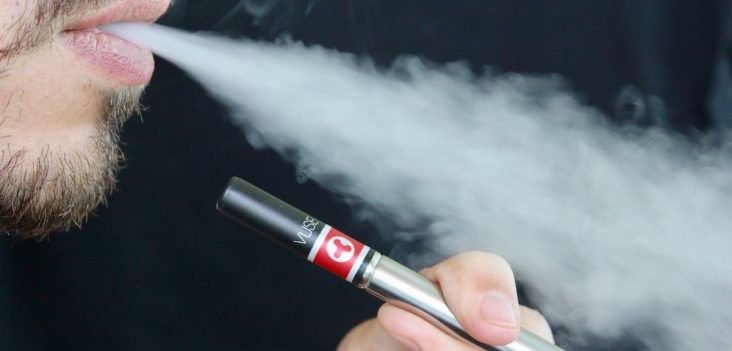Bill would raise e-cigarette taxes, tobacco age to 21
by February 25, 2019 7:40 pm 1,299 views

A bill filed Monday (Feb. 25) would enact e-cigarette and cigarette paper taxes to fund a National Cancer Institute-Designated cancer center in Arkansas. It also would dedicate to that fund all revenues derived from the sale of medical marijuana. And it would increase the minimum age for purchasing tobacco and e-cigarette products to age 21.
House Bill 1565 by Rep. Andy Davis, R-Little Rock, would impose a tax of 10 cents per milliliter of e-liquid sold. It also would impose a tax of 50 cents per package of 32 sheets of cigarette paper used for hand-rolling cigarettes.
Those revenues would be dedicated to a University of Arkansas for Medical Sciences National Cancer Research Center Designation Trust Fund. The fund is meant to enable UAMS’ Winthrop P. Rockefeller Cancer Institute to become an NCI research center. The fund was created by Act 181 by Sen. Missy Irvin, R-Mountain View.
Arkansas’ cigarette tax is $1.15 per pack, but the state subjects e-cigarettes and other vapor products, which also contain nicotine, only to sales and use taxes. E-cigarettes are not subject to a federal excise tax. The bill also would dedicate all tax revenues from the sale of medical marijuana to the NCI trust fund. Medical marijuana will be subject to a regular sales tax and a 4% excise tax after it hits the market, but the excise tax is scheduled to sunset July 1.
However, House Bill 1212 by Rep. Doug House, R-North Little Rock, would extend that date to July 1, 2021. It has passed the House and has been referred to the Senate Revenue and Tax Committee.
The bill also would change the definition of a minor from under age 18 to under age 21 for the purpose of purchasing tobacco and e-cigarette products, though the age would not change for members of the military or anyone who is age 19 by Dec. 31.
“We’re trying to prevent young people from smoking, and we’re trying to get the vape further away from kids,” Davis said. “But we still want to allow vape as a cessation product, so we don’t want to make it too difficult to get if somebody over 21 is trying to quit and they want to use vape as an off ramp for that.”
The bill would preempt county and local governments from creating more restrictive tobacco product rules. Davis said it’s difficult for the state to enforce different rules.
As already exists with tobacco products, a court could order young people possessing e-cigarette products to perform up to three hours of community service and enroll in a tobacco education program.
Attaining NCI Research Center status would provide the Rockefeller Cancer Institute more access to research funds and would give patients access to clinical trials, cancer treatments and prevention services. There are 70 NCI-designated centers in 36 states, but none in Arkansas, Mississippi or Louisiana. Oklahoma received the 70th designation in 2018.
Dr. Cam Patterson, UAMS’ chancellor, said in an interview Feb. 8 that the designation would increase the number of NCI-funded physicians and scientists. It would generate about $72 million annually for Arkansas and create 1,500 jobs in the first five years. A funding stream of between $10 million and $20 million annually is needed to establish and maintain a center. UAMS is trying to raise $30 million in one-time funds from donors. Davis said the bill would raise $10.5 million annually until the medical marijuana excise tax sunsets. It then would raise more than $8 million.
In a press conference Feb. 19, Gov. Asa Hutchinson indicated support for increasing taxes on using e-cigarettes, otherwise known as “vaping,” though he was not referring to any particular bill.
“The vape tax, I’m absolutely open to that because that’s a problem for our youth, it’s something that should be addressed in a regulatory fashion, and so I do support that,” Hutchinson said.
Davis said Monday he had not asked the governor for his support and said UAMS had not been involved in drafting his bill. Sen. Jonathan Dismang, R-Searcy, is the Senate sponsor of House Bill 1565.
Other tobacco-related bills have been filed.
House Bill 1519 by Rep. Lee Johnson, R-Greenwood, would prohibit the sale of tobacco, vapor, alternative nicotine, and e-liquid products, as well as cigarette papers, to individuals under age 21. Members of the Armed Forces would be exempted. Irvin is a co-sponsor.
Senate Bill 347 by Sen. Will Bond, D-Little Rock, would create a privilege tax on e-cigarettes equal to the total tax levied on tobacco products. The first $10 million would be dedicated to the NCI trust fund, with any remaining revenues credited to UAMS’ operating cash fund.
Oklahoma last year raised its cigarette tax by $1 to $2.03 a pack. Missouri’s, by contrast, is 17 cents per pack and can only be changed by the voters.
The national average is $1.73 per pack, according to the Truth Initiative, a nonprofit public health organization funded by the 1998 tobacco settlement between states and major tobacco firms.
